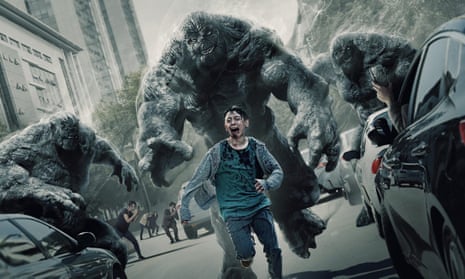The easiest thing in the world would be to call Hellbound the new Squid Game. After all, they’re both South Korean dramas, they both deal in violent death and they’re both smash hits on Netflix. This week it was reported that Hellbound had topped ratings in 80 different countries within 24 hours of premiering, and had overtaken Squid Game as the platform’s most-watched show.
Of course, the comparisons are valid. Squid Game was such a marker – not only in putting Korean dramas firmly in the mainstream, but in underlining the popularity of shows not in English – that it was always going to swallow up the next thing to come along. Remember how every female-fronted comedy was called “the new Fleabag” for years after that show debuted? This is a similar thing, only with screaming Korean people dying in unimaginably horrible ways.
However, I desperately hope Hellbound can shake off such easy comparisons. Not only does it deserve to stand on its own two feet, but it also happens to be good. Like, insanely good. Better than Squid Game. Better than most things, even. If you haven’t watched Hellbound, drop everything now and do it.
Its premise is just wonderful. Out of the blue, people are visited by an eerie face that materialises in front of them, and told the time and date of their imminent death. And then, just like clockwork, three hulking great CGI brutes burst in from another dimension and pulverise that person in a beatdown that results in full-body incineration.

Lots of other work would just leave it there – indeed, the demonic smackdowns have a slight sub-Marvel feel – but where Hellbound thrives is in its willingness to show us what happens around their edges. The sudden knowledge that some force is deliberately choosing certain people to be murdered by supernatural beings instantly reshapes all of society as we know it. Individuals who claim to have an insight into the cause are elevated to messianic status. Vast, ugly conspiracy theories are seized upon by millions. The world’s population finds itself enveloped in a morass of fear and confusion. Before long the demons themselves are reduced to sideshow fare.
In that respect, Hellbound is actually more reminiscent of two quieter, more cerebral shows. Although the grabbier “here’s when you will die” hook is lifted straight from The Ring, tonally it has much more in common with The Leftovers and The Returned; shows that shone a light on the fragility of the human experience, that reminded us that it doesn’t take much for everything to fall apart completely. You don’t throw around comparisons to The Leftovers lightly, but Hellbound deserves it.
It’s for this reason that I don’t think Hellbound will permanently steal Squid Game’s crown. Squid Game was a show that, in hindsight, was made with one eye on the internet. The outfits, the masks and the chants were surely designed to fuel memes (as they did), and it was rooted in the sort of easy nostalgia that keeps your parents on Facebook. Squid Game was big and broad and episodic, to the extent that my six-year-old has developed a fairly good understanding of it, based purely on peripheral internet content.
But Hellbound is a much darker, knottier affair. There are nods to internet culture – most noticeably in the Arrowhead, a QAnon-esque group that frequently appears to scream hysterical frenzy-whipping claptrap directly on to a livestream – but they are presented more in damnation than overture. Characters here are not just faceless numbers in tracksuits, either, with each one given their own fleshed-out backstory. With every whiplash-inducing twist – and there are a lot – you are forced to feel the full weight of each consequence. It is a lot less fun than Squid Game, and much harder to digest.
This is why it is so worthwhile. Hellbound is a truly exceptional drama wrapped in only the lightest of genre thrills. It might currently find itself swept up in Squid Game’s wake, but I guarantee that, of the two, it’s the show that will still be talked about a decade from now.

Comments (…)
Sign in or create your Guardian account to join the discussion